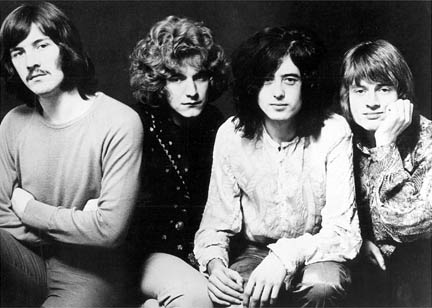Led Zeppelin arose from the ashes of the Yardbirds with a completely new interpretation of the blues that challenged preconceptions and defined heavy metal. Guitarist Jimmy Page had been a celebrated session man for years before joining the Yardbirds for their last album 'Little Games'. When the band fell apart, Page and bassist Chris Dreja were asked to recruit new members so the band could do a tour of Scandinavia. They brought in singer Robert Plant who suggested drummer John Bonham who had played with him in Band of Joy; but Dreja left and was replaced by John Paul Jones. The New Yardbirds did the tour and played on P.J. Proby’s album, 'Three Week Hero' before they were forced to come up with a new name when Dreja filed suit.
Page reflected at the time about the end of the Yardbirds: "We didn't do any gigs in England for two years, so no wonder we lost popularity. But just before we split we did a couple of colleges that were really fantastic. I was really knocked out...We were a happy group and used to get on well socially until we got on stage and Keith lost all enthusiasm. I used to say, 'Come on, let's make an effort,' but it had all gone. When they split, I don't think Jim wanted to leave, but Keith was depressed. I think it did us all a favour, because the new chaps are only about 19 and full of enthusiasm. It was getting a bit of a trial in the old group...It's blues, basically, but not Fleetwood Mac style. I hate that phase 'progressive blues'. It sounds like a hype, but it's more or less what the Yardbirds were playing at the end, but nobody knew about it because they never saw us...I thought I'd never get a band together. I've always shied away from leadership in the past because of all that ego thing. I know old Eric wanted to get a thing together with Stevie but neither of them like leading...I didn't want the Yardbirds to break up, but in the end it was too much of a headache. I just wanted to play guitar, basically, but Keith always had this thing of being overshadowed by Jeff and that, which was nonsense. It was great when we had the two lead guitars...It's refreshing to know that today you can go out and form a group to play the music you like and people will listen. It's what musicians have been waiting for these last twenty years."
The band came up with the name Led Zeppelin, as the story goes, after the Who's Keith Moon and John Entwistle said that a band with Page and Jeff Beck would go down like a lead balloon. Their debut was recorded at Olympic Studios in London with Jimmy Page on acoustic, electric and pedal steel guitar, backing vocals, and production; Robert Plant on lead vocals, harmonica, and occasional bass; John Bonham on drums, timpani, percussion, and backing vocals; and John Paul Jones on bass guitar, organ, and backing vocals. Viram Jasani played tabla on "Black Mountain Side" and Glyn Johns handled engineering and mixing. Page and the band's manager Peter Grant paid for the sessions themselves, using thirty-six hours of studio time over several weeks. With their debut complete, they secured a deal with Atlantic Records that included a massive advance and allowed them creative control.
Jones had been a studio musician with Page: "I think he was the youngest session musician until I came along. We were always really glad to see each other on the sessions, because it meant that you had a young, hip rhythm section...He had this whole thing about ‘a dynamic rock band… a whole light-and-shade thing.’ Which was pivotal, and it informed every musical decision that he made. I mean, there weren’t dynamic rock bands in those days. Everything was either a soft, folky-rock type thing, or just blasting all the time. It was very important to him...in the studio it was very democratic. Basically, it’s like, if you buy a dog you don’t bark yourself. The band was made up of people who were good musicians and good performers, and he let us get on with it. We would all make a lot of decisions. But he was in charge of the overall sound...We seemed to know which ideas would work and which ones wouldn’t. You’d try an idea, and if it didn’t work, everybody just went, ‘Nah’. And then, okay, let’s try something else. We didn’t have to be told. It’s the professional way of working, and it’s very easy to do it like that, and nobody’s feelings are hurt.”
'Led Zeppelin' charted at number thirty-two in Germany, nineteen in France, sixteen in Norway, eleven in Canada, ten in the US, nine in Australia, and number six in the UK.
http://www.ledzeppelin.com/
Led Zeppelin
full album:
1. "Good Times Bad Times" John Bonham, John Paul Jones, Jimmy Page 2:44
2. "Babe I'm Gonna Leave You" Anne Bredon, Page, Robert Plant 6:40
http://www.youtube.com/watch?v=smUFDvltYrA
3. "You Shook Me" Willie Dixon, J. B. Lenoir 6:30
http://www.youtube.com/watch?v=dbwG0u3hb7M
http://www.youtube.com/watch?v=TECHTM5clpw
4. "Dazed and Confused" Page 6:26
http://www.youtube.com/watch?v=IC6SwzXvyzw
5. "Your Time Is Gonna Come" Jones, Page 4:34
http://www.youtube.com/watch?v=fssblRRCgmg
6. "Black Mountain Side" Page 2:13
http://www.youtube.com/watch?v=RGww9FPvyFA
7. "Communication Breakdown" Bonham, Jones, Page 2:29
http://vimeo.com/41183013
Led Zeppelin - Communication Breakdown from fazelinear videos on Vimeo.
8. "I Can't Quit You Baby" Dixon 4:43
http://www.youtube.com/watch?v=29PSPafL54o
9. "How Many More Times" Bonham, Jones, Page 8:28
http://www.youtube.com/watch?v=qSIS0o7vtPE


No comments:
Post a Comment